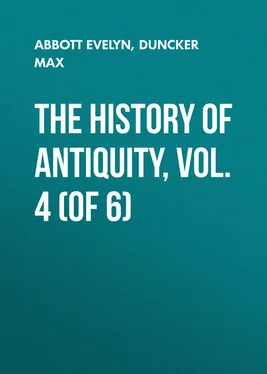Max Duncker - The History of Antiquity, Vol. 4 (of 6)
Здесь есть возможность читать онлайн «Max Duncker - The History of Antiquity, Vol. 4 (of 6)» — ознакомительный отрывок электронной книги совершенно бесплатно, а после прочтения отрывка купить полную версию. В некоторых случаях можно слушать аудио, скачать через торрент в формате fb2 и присутствует краткое содержание. Жанр: foreign_antique, foreign_prose, Историческая проза, на английском языке. Описание произведения, (предисловие) а так же отзывы посетителей доступны на портале библиотеки ЛибКат.
- Название:The History of Antiquity, Vol. 4 (of 6)
- Автор:
- Жанр:
- Год:неизвестен
- ISBN:нет данных
- Рейтинг книги:5 / 5. Голосов: 1
-
Избранное:Добавить в избранное
- Отзывы:
-
Ваша оценка:
- 100
- 1
- 2
- 3
- 4
- 5
The History of Antiquity, Vol. 4 (of 6): краткое содержание, описание и аннотация
Предлагаем к чтению аннотацию, описание, краткое содержание или предисловие (зависит от того, что написал сам автор книги «The History of Antiquity, Vol. 4 (of 6)»). Если вы не нашли необходимую информацию о книге — напишите в комментариях, мы постараемся отыскать её.
The History of Antiquity, Vol. 4 (of 6) — читать онлайн ознакомительный отрывок
Ниже представлен текст книги, разбитый по страницам. Система сохранения места последней прочитанной страницы, позволяет с удобством читать онлайн бесплатно книгу «The History of Antiquity, Vol. 4 (of 6)», без необходимости каждый раз заново искать на чём Вы остановились. Поставьте закладку, и сможете в любой момент перейти на страницу, на которой закончили чтение.
Интервал:
Закладка:
The revision carries the justification and legitimisation of the Pandus even beyond the destruction of Duryodhana and the Kurus. Owing to his blindness the king Dhritarashtra could not be brought into the battle and slain there. Where the old poem represents the mother of the slain Kurus as cursing Krishna, the revision interpolates a reconciliation between the aged Dhritarashtra and the destroyers of his race, a reconciliation naturally accomplished through the instrumentality of a Brahman. Hence Yudhishthira is allowed to ascend the throne of Hastinapura with the consent of the legitimate king, and reign in his name. Lastly, in order to remove every stain from the Pandus, they are represented as renouncing the world, and dying on a pious pilgrimage to the divine mountain.
A second revision of the poem – which, as will become clear below, cannot, in any case, have been made before the seventh century B.C. – represents the Pandus as becoming the sons of gods, and thus makes still easier the task of their justification. It was not by Pandu that Kunti became the mother of Yudhishthira, Arjuna, and Bhima, but the first and most just of all rulers she bore to the very god of justice. Hence his claim to the throne and his righteous life were established from the first. The second brother, the great warrior Arjuna, owed his birth to Indra; the third, Bhima, to the strong wind-god, Vayu; the twin-sons of Madri are then naturally the children of the twins in heaven, the two Açvins. More serious is the change of Krishna, i. e. the black, into the god Vishnu, assumed in a third revision, which was completed in the course of the fourth century B.C. (Book VI. chap. viii.). Krishna, after whom the city of Krishnapura on the Yamuna is said to have been named, 148belongs to the tribe of the Yadavas, who were settled on the Yamuna, in the district of Mathura. He is the son of the cow-herd Nanda and his wife Yaçoda; he is himself a cow-herd, drives off herds of cows, carries away the clothes of the daughters of the herdsmen while they are bathing, and engages in many other exploits of a similar kind. He rebels against the king of Mathura, and slays him. His crafty and treacherous plans then bring the heroes of the Kurus to destruction; at length, with his whole nation, he succumbs to the curse hurled against him by the mother of Duryodhana. Out of this form of the ancient poem the later revision has made an incarnation of Vishnu, the beneficent, sustaining god. The child of Vasudeva and Devaki, who bears all the marks of Vishnu, is no other than Vishnu, who permits himself to be born from Devaki; he is changed with the child of Yaçoda, which was born in the same night. But these new points of view are not thoroughly carried out; the Mahabharata is not consistent about the origin of Krishna or his divine nature. At one time he is a human warrior, at another the highest of the gods, and the original position both of Krishna and the Pandus is still perceptible. 149
The second great Epic of the Indians – the Ramayana – is essentially distinguished from the poems of the great war. Here also a legend, or ancient ballads, may have formed the basis; here, too, it is clear that a later redaction has changed the hero of the poem into an incarnation of a god. But the legend is already changed into the fairy tale, of which the scene is principally the Deccan, the banks of the Godavari, the island of Lanka (Ceylon) where the Aryas first arrived about the year 500 B.C. The cast of the poem as a whole is essentially different from that of the Mahabharata. The old legend may have related the story of a prince who wins his wife by his power to string the great bow of her father, and who, when banished from the banks of the Sarayu, contends in the Himavat, or in the south of the Ganges, against the giants dwelling there. These giants carried off his wife from the forest hut, and he is only able to regain her after severe struggles. Rama, the banished prince, is supposed to be a son of a king of the Koçalas (the Tritsus of the Rigveda), who had taken up their abode on the Sarayu. Daçaratha, the father of Rama, had apparently reigned a long time before the great war; he was descended from Ikshvaku, the son of Manu. According to the Vishnu-Purana, Daçaratha is the sixtieth king of this family, the eleventh after Sudas, who repelled the attack of the Bharatas. 150In their battle the Tritsus were aided by the priest Vasishtha, to whom in the poem of Rama the same place is allotted which in the Mahabharata is first allotted to Viçvamitra and then to Vyasa. Without regard to the ancient poems and their strongly-marked traits of great battles and mighty contests, the priests entirely transformed the legend of Rama from their point of view into the form in which it now lies before us; and this took place at a period of Indian life, when the warlike impulse had long given way to peaceful institutions, and the requirements of the priests had driven out the military code of honour and martial glory – a time when the weaker sides of the Aryan disposition, submission and sacrifice, had won the victory over the hard and masculine qualities of activity and self-assertion. The Ramayana gives expression to the feeling of calm subjection, virtuous renunciation, passionless performance of duties, patient obedience, unbroken reticence. Throughout, prominence is given to the system of priestly asceticism, of the eremite's life in the forest, of voluntary suicide. Here we can scarcely find any echoes of that desire of honour, that jealousy, that lust of battle, and eagerness for revenge, which occur unmistakably in the Mahabharata; nothing remains of the knightly pride which scorns to give a blow forbidden by the rules of the battle. The hero of the Ramayana is a hero of virtue, not of the battle. He commends without ceasing renunciation and the fulfilment of duties; he abandons throne and kingdom; he gives up his right out of obedience to his father, and respect for a promise made by him; his wife leads him against his will into the desert, because she also knows her duties. Respect, devotion, and sacrifice in the relation of children to their parents, of younger brothers to the elder, of the wife to her husband, of subjects to their lords, are described with great poetical beauty and power, but often with the weakest sentimentality. The mission of the hero in his banishment is the defence of the settlements of holy penitents against the giants. But his battles are no merely human struggle; he not only strings the bow of Çiva, he breaks it, so that it sounds like the fall of a mountain or like Indra's thunder. He fights with the bow of Indra and the arrows of Brahman, and at length even with the chariot of Indra against the giants. These battles are no less legendary than are his confederates' against the giants of Lanka, the vulture Jatayu, the apes and bears, which build him a bridge into that island. These are all described with an exaggeration and monstrous unreality into which Indian poetry only strayed after traversing many stages. We do indeed once hear, even in the Ramayana, of heroes "who never turned in the battle, and fell struck in front." Even here, in isolated passages, the old manly independence breaks forth, which, conscious of its strength, beats down injustice instead of enduring it, and makes a path for itself, but only in order to place in a still clearer light a quick compliance, a patient fulfilment of duties, and thus allow to the latter a greater advantage.
At this day Epic poetry lives in India in full force, just as it left the hands of the priests. At the close of the Mahabharata we are told: "What the Brahman is to the rest of mankind, the cow to all quadrupeds, the ocean to the pool, such is the Mahabharata in comparison with all other histories." To the readers and hearers of the Mahabharata and Ramayana the best rewards in this life and the next are promised: wealth, forgiveness of sins, entrance into heaven. At all festivals and fairs, at the marriages of the wealthy, episodes from one of the two poems are recited to the eager crowd of assembled hearers; the audience accompany the acts and sufferings of the heroes with cries of joy or signs of sorrow, with laughter or tears. In the village, the Brahman, sitting beneath a fig-tree, recites the great poems, in the order of the events no doubt, to the community. The interest of the audience never flags. If the piece recited touches on happy incidents – on victory, triumph, happy return home, the marriage or consecration of the heroes, the village is adorned with crowns as at a festival. The Indians live with the forms of their Epos; they know the fortunes of these heroes, and look on them as a pattern or a warning. The priests have fully realised their intention of setting before the nation in these poems a mirror of manners and virtue.
Читать дальшеИнтервал:
Закладка:
Похожие книги на «The History of Antiquity, Vol. 4 (of 6)»
Представляем Вашему вниманию похожие книги на «The History of Antiquity, Vol. 4 (of 6)» списком для выбора. Мы отобрали схожую по названию и смыслу литературу в надежде предоставить читателям больше вариантов отыскать новые, интересные, ещё непрочитанные произведения.
Обсуждение, отзывы о книге «The History of Antiquity, Vol. 4 (of 6)» и просто собственные мнения читателей. Оставьте ваши комментарии, напишите, что Вы думаете о произведении, его смысле или главных героях. Укажите что конкретно понравилось, а что нет, и почему Вы так считаете.












